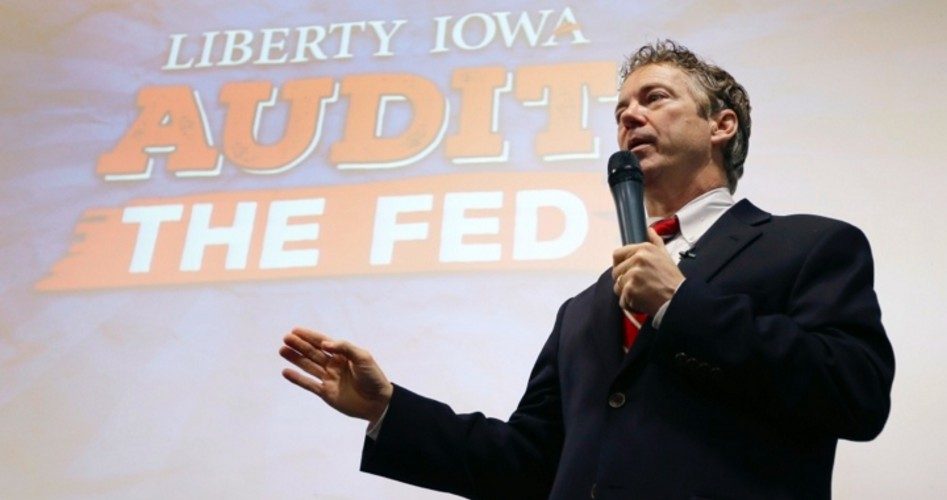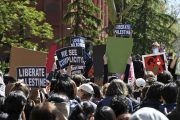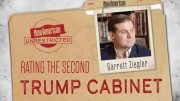
Republican presidential hopeful Rand Paul made his signature legislative effort the theme of his first event in Iowa this year, as he called once again for congressional oversight of the Federal Reserve Board.
“I think there needs to be some sunshine,” the Kentucky senator said at an Audit the Fed rally in Des Moines Friday night. “I’m going to fight ’em and we’re going to get a vote” on the bill, he predicted.
Taking on the Federal Reserve is something of a family tradition with Paul, whose father, former congressman Ron Paul, made auditing the Fed a central theme in his campaigns for the Republican presidential nomination in 2008 and 20012. His bill to audit the independent network of privately owned banks that controls the nation’s money supply and interest rates passed in the Republican-controlled House by a vote 327-98, and a similar measure won House approval, 333-92, last fall. Both bills were blocked by the Democratic leadership in the Senate.
Sen. Paul reintroduced the bill last month, but even with Republicans now in charge of both houses of Congress, passage of the measure remains an uphill battle. Fed Chairman Janet Yellen has vowed to fight the bill, and President Obama will likely veto it if it reaches his desk.
“Who in their right mind would ask the Congress of the United States — who can’t cobble together a fiscal policy — to assume control of monetary policy?” Richard Fisher, president of the Federal Reserve Bank of Dallas, asked in an interview with the Washington publication The Hill.
The Fed currently is audited by a private accounting firm, as arranged by the inspector general and the Government Accountability Office. Paul’s bill would require the comptroller general to complete an audit within a year of the bill’s enactment and to report its findings to Congress. Governors of the board and bankers within the system argue that would disrupt markets and undermine the Fed’s ability to carry out its mission free of political pressure.
“This runs the risk of monetary policy decisions being based on short-term political considerations instead of the longer-term health of the economy,” Charles Plosser, president of Federal Reserve Bank of Philadelphia, told The Hill.
Jerome Powell, a member of the Fed’s board of governors, plans to deliver a speech Monday about Paul’s bill and other related proposals, the Wall Street Journal reported Friday. The Audit the Fed Act might attract more national attention than similar bills have received. Senate Banking Committee Chairman Richard Shelby (R-Ala.) has said he is interested in holding hearings on the bill, and its 30 co-sponsors include Senators Marco Rubio of Florida and Ted Cruz of Texas, Republicans who, like Paul, are likely to be heard from early and often over the next several months as near-certain presidential candidates.
Senate Majority Leader Mitch McConnell (R- Ky.) is also a co-sponsor, but it is far from certain that the bill will be a priority of the new Senate leadership. The current session will be a busy one, with bills to fund the Department of Homeland Security and extend the Highway Trust Fund, along with nominations for Attorney General and Secretary of Defense, now before the Senate.
“Taxpayers deserve to know what government agencies are doing in their name,” McConnell tweeted the day after Paul reintroduced the Audit the Fed Act. But though the Fed chairman and members of the governing board are nominated by the president and confirmed by the Senate, the semi-autonomous Federal Reserve is not a government agency. Critics have long argued that its power to increase or contract the money supply and raise of lower interest rates is a principal cause of financial upheavals, and that its decisions do not promote the “health of the economy” nearly as well as they advance the interests of well-connected bankers and investment brokers on Wall Street.
“Is there a revolving door between Wall Street, the Fed, and back to Wall Street again?” Paul asked at the Des Moines rally. It’s a question and an issue he and possibly other candidates will raise early and often in Iowa, New Hampshire, South Carolina, and other key caucus and primary states in the long road toward their party’s 2016 presidential nomination.
Photo of Sen. Rand Paul: AP Images



